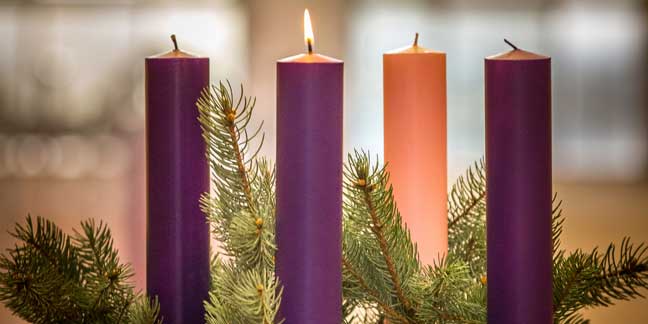Today we celebrate the end of the Christmas season, and that may make you ask yourself why we would celebrate it, especially when Christmas “ended” a while ago. In today’s readings God himself celebrates what is taking place in the Gospel: John the Baptist baptizes Jesus in the river Jordan.
In today’s First Reading the Lord speaks of Jesus as his servant who is about to begin something wonderful: his public life. He’s going to bring justice to the world, be a light for the nations, open the eyes of the blind, and free prisoners, and God is keeping his promise through Jesus’ mission on earth. In short, God is sending out the Savior today to get to work. During Christmas we celebrated the birth of the Savior. On today’s feast, the Baptism of the Lord, we’re celebrating him finishing his silent years in Nazareth and going out to preach salvation to the world.
In today’s Second Reading Peter rejoices that salvation is not just for the people of Israel, but for everyone who respects God and acts uprightly. When Jesus is baptized in the Jordan he institutes a new kind of baptism. John talks about that baptism in the Gospel today as different from his: it is a baptism of the Holy Spirit. Peter is speaking to Cornelius, who was the first non-Jew to be baptized in Church history. The Jews thought originally that the Savior would only come for the Jews, but then the Holy Spirit revealed to Peter and the Church through Cornelius’ situation that the Savior was coming for every nation that “fears God” (respects God) and “acts uprightly” (acts in a good way). The Holy Spirit always works gradually. Cornelius had heard about Jesus and his promise of salvation and had been praying for a sign. Peter was praying too, and they didn’t know each other at all. An angel came to Cornelius and told him to send men to find and bring Peter. Cornelius was a Roman centurion, and since he wasn’t a Jew, Peter wouldn’t have visited him unless the Holy Spirit had said it was okay in a dream, because Jews didn’t enter the homes of non-Jews.
As Peter in today’s Second Reading rejoices that the Savior has come for everyone, he recalls Jesus’ baptism in the Jordan, recalled in today’s Gospel, as the beginning of doing good and healing all those who were oppressed by the devil. Our Lord’s public ministry began with his baptism in the Jordan, so we celebrate today with God, with Peter, with Cornelius, and with everyone who has become Christian since through the waters of baptism. We celebrate that Jesus began to go out and do good, heal the sick, give sight to the blind, and free those who are imprisoned by sin. We also celebrate baptism today. Church Fathers and Doctors have said Our Lord sanctified the waters for baptism even as he took the plunge into the waters of the Jordan to receive John’s. In remembering Our Lord’s baptism we remember our own with gratitude.
In today’s Gospel the Father says Jesus is his beloved son and he is well pleased with him. When you received baptism Our Lord was pleased with you too. For many of us that was a long time ago. It begs the question: am I still pleasing the Lord? We seek approval from those we love, and who loves us more than Our Lord? Make an extra effort this week to live in a way that is pleasing to Our Lord. That’s the best way to show your appreciation for the gift of baptism.
Readings: Isaiah 42:1–4, 6–7; Psalm 29:1–4, 9–10; Acts 10:34–38; Luke 3:15–16, 21–22. See also The Baptism of the Lord, Cycle C (1st Sunday in Ordinary Time).





